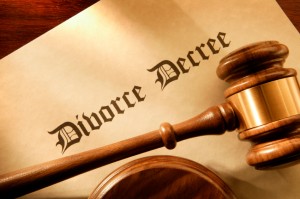Beware Of An Oral Divorce Agreement

Often, parties and their
attorneys are at the courthouse for a mandatory court appearance, such
as the Early Settlement Panel or an intensive settlement conference with
a judge, and an agreement is reached. Many attorneys, and judges, are
tempted to place the agreement on the record, meaning that they may read
the terms of the agreement in open court. Many litigants see this as wonderful
given that they may not have to come back to court. However, an oral divorce
agreement is extremely dangerous and should be avoided in most circumstances.
One of our clients is a great example of the dangers of an oral divorce
agreement. This particular client was represented by a different attorney
for her divorce. An agreement was reached while at the courthouse, and
the attorneys decided to place the oral divorce agreement on the record.
As often happens, the words used when outlining the agreement were ambiguous
in multiple places, some of which were extremely important provisions
regarding the children and support, and multiple issues were not addressed.
After an oral divorce agreement is placed on the record, one of the attorneys
must prepare something called an Amended Judgment of Divorce, incorporating
the oral terms into written form. Some judges stay on top of this, while
others let it fall through the cracks if it is never done.
In the case of our client, the attorneys involved in the divorce never
agreed upon the terms of the written agreement. They argued about what
was placed on the record and what the ambiguous terms actually meant.
Given the lack of agreement, a written agreement was never produced. To
add insult to injury, our client’s ex-husband died and she had nothing
in writing showing what the divorce agreement was. More importantly, issues
of life insurance and other important items were not addressed by the
divorce attorneys on the record, causing tremendous confusion and burden
on her and her children when the ex-husband died. All of this could have
been avoided by simply producing the written agreement, scheduling another
court date, and having both litigants read the terms and sign.
Just today, we witnessed a case while sitting in a courtroom that truly
illustrates why you should never allow an oral divorce agreement to end
your marriage. Another attorney was placing an “agreement”
on the record that we, as attorneys, could not even understand. It was
convoluted and non-specific. The oral agreement jumped around from custody
to credit cards, back to custody, then to the marital home, and then back
to custody. It was impossible for either litigant to truly understand
what they were agreeing to. Fortunately for the litigants, the trial judge
saw what was happening and escorted the attorney through every possible
issue in a divorce to ensure a complete agreement was on the record. That
was not the trial judge’s job, but both litigants owe the judge
substantial thanks for putting forth the effort their attorneys clearly
did not want to do. The trial judge indicated that the agreement needed
to be reduced to written form by a date certain or everyone would have
to return to court to settle the form of the written agreement. We suspect
that the parties will have to return to court when they realize they do
not agree on what they actually agreed upon. Just being patient and waiting
to sign an agreement would have resolved the problems these particular
litigants are likely going to experience.
We do not permit oral divorce agreements in our office because they are
a disservice to our clients. More importantly, do not let anyone tell
you that you have to place your agreement on the record. The judges will
not force you to go that route, and you should not let your attorney convince
you to put something as important as your divorce agreement on the record.
If you have any questions about an oral divorce agreement, do not hesitate to
. As always, we will not tell you what you want to hear. We will tell you
what you need to know.



